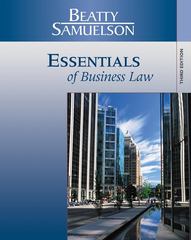Question
When does the equilibrium occur? A)The price paid by consumers equals the price received by suppliers B)All else remains the same C) The relationship between
When does the equilibrium occur?
A)The price paid by consumers equals the price received by suppliers
B)All else remains the same
C) The relationship between the price of a good and the quantity supplied by producers
D) When consumers want it
The United States argues that it is possible for a person to be simply a carrier of a disease, that is, to be capable of spreading a disease without having a "physical impairment" or suffering from any other symptoms associated with the disease. The United States contends that this is true in the case of some carriers of the Acquired Immune Deficiency Syndrome (AIDS) virus. From this premise the United States concludes that discrimination solely on the basis of contagiousness is never discrimination on the basis of a handicap. The argument is misplaced in this case, because the handicap here, tuberculosis, gave rise both to a physical impairmentandto contagiousness. This case does not present, and we therefore do not reach, the questions whether a carrier of a contagious disease such as AIDS could be considered to have a physical impairment, or whether such a person could be considered, solely on the basis of contagiousness, a handicapped person as defined by the Act.
Question 1
How can the Glasgow Coma Scale be assessed in a patient with receptive
or expressive aphasia?
Question 2
How common is it for someone suffering a transient ischaemic attack
(TIA) to totally lose consciousness? Also, what is the mechanism for
losing consciousness with a TIA?
Question 3
What should the management be for a stenosis in the carotid artery
causing transient ischaemic attack (TIA), and when is surgery
recommended?
Question 4
In a patient with central retinal artery branch occlusion with carotid
artery stenosis, what is the best management: warfarin, aspirin or carotid
endarterectomy?
Question 5
If a young patient who has suffered a stroke has a normal mental state,
would this exclude a cerebral venous occlusion as an aetiology?
Question 6
Does persistent hiccough following cerebrovascular ischaemic stroke
localize to the medulla or to any other site?
Question 7
By what mechanism is vertebrobasilar insufficiency associated with
circumoral numbness?
Question 8
Why does lateral medullary syndrome result in ipsilateral diplopia due
to cranial nerve VI?
Question 9
I have seen many established ischaemic stroke patients with CTdocumented capsular infarction and hemi-hypotonia despite exaggerated
reflexes. How would you explain the hypotonia? Could it be due to a
corticorubral fibre lesion?
Question 10
Thrombolytic therapy is used in patients with a cerebral infarct within
the first 3 hours, whereas stroke by definition lasts24 hours. So how
do we define that it is infarct and not a transient ischaemic attack (TIA)
on a CT scan within the first 3 hours in order to start tissue plasminogen
activator (tPA) treatment?5160,help m
Step by Step Solution
There are 3 Steps involved in it
Step: 1

Get Instant Access to Expert-Tailored Solutions
See step-by-step solutions with expert insights and AI powered tools for academic success
Step: 2

Step: 3

Ace Your Homework with AI
Get the answers you need in no time with our AI-driven, step-by-step assistance
Get Started


